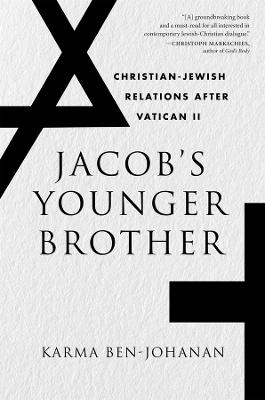
Jacob’s Younger Brother
Christian-Jewish Relations after Vatican II
Seiten
2024
Harvard University Press (Verlag)
978-0-674-29558-2 (ISBN)
Harvard University Press (Verlag)
978-0-674-29558-2 (ISBN)
At Vatican II, the Catholic Church renounced the teaching that Jews had killed Christ and pivoted toward reconciliation. Jewish leaders responded in kind. Karma Ben-Johanan pierces the veil of interfaith dialogue, emphasizing rabbinical literature suspicious of the sudden Catholic turn and Catholic theologians struggling to maintain tradition.
A Seminary Co-op Notable Book
“An astute and evenhanded study of how both faiths view themselves and each other.”
—Publishers Weekly
“An illuminating and important new book…An intellectual, cultural, and political challenge…[F]or anyone for whom the Jewish-Christian story is an important element in defining his or her identity.”
—Israel Jacob Yuval, Haaretz
“An extraordinarily sophisticated, insightful and provocative examination of how Roman Catholics and Orthodox Jews addressed the prospect of reconciliation in the second half of the twentieth century.”
—Glenn C. Altschuler, Jerusalem Post
“A volume from which both Jewish and Catholic scholars may learn…This is an excellent book.”
—Eugene J. Fisher, Catholic News Service
A new chapter in Jewish-Christian relations opened in the second half of the twentieth century when the Second Vatican Council exonerated Jews from the accusation of deicide and declared that the Jewish people had never been rejected by God. In a few carefully phrased statements, two millennia of deep hostility were swept into the trash heap of history.
But old animosities die hard. While Catholic and Jewish leaders publicly promoted interfaith dialogue, doubts remained behind closed doors. Drawing on extensive research in contemporary rabbinical literature, Karma Ben-Johanan shows that Jewish leaders welcomed the Catholic condemnation of antisemitism but were less enthusiastic about the Church’s sudden urge to claim their friendship. Catholic theologians hoped Vatican II would turn the page on an embarrassing history, while Orthodox rabbis, in contrast, believed they were finally free to say what they thought of Christianity.
Jacob’s Younger Brother pulls back the veil of interfaith dialogue to reveal how Orthodox rabbis and Catholic leaders spoke about each other when outsiders were not in the room. There Ben-Johanan finds Jews reluctant to accept the latest whims of a Church that had unilaterally dictated the terms of Jewish-Christian relations for centuries.
A Seminary Co-op Notable Book
“An astute and evenhanded study of how both faiths view themselves and each other.”
—Publishers Weekly
“An illuminating and important new book…An intellectual, cultural, and political challenge…[F]or anyone for whom the Jewish-Christian story is an important element in defining his or her identity.”
—Israel Jacob Yuval, Haaretz
“An extraordinarily sophisticated, insightful and provocative examination of how Roman Catholics and Orthodox Jews addressed the prospect of reconciliation in the second half of the twentieth century.”
—Glenn C. Altschuler, Jerusalem Post
“A volume from which both Jewish and Catholic scholars may learn…This is an excellent book.”
—Eugene J. Fisher, Catholic News Service
A new chapter in Jewish-Christian relations opened in the second half of the twentieth century when the Second Vatican Council exonerated Jews from the accusation of deicide and declared that the Jewish people had never been rejected by God. In a few carefully phrased statements, two millennia of deep hostility were swept into the trash heap of history.
But old animosities die hard. While Catholic and Jewish leaders publicly promoted interfaith dialogue, doubts remained behind closed doors. Drawing on extensive research in contemporary rabbinical literature, Karma Ben-Johanan shows that Jewish leaders welcomed the Catholic condemnation of antisemitism but were less enthusiastic about the Church’s sudden urge to claim their friendship. Catholic theologians hoped Vatican II would turn the page on an embarrassing history, while Orthodox rabbis, in contrast, believed they were finally free to say what they thought of Christianity.
Jacob’s Younger Brother pulls back the veil of interfaith dialogue to reveal how Orthodox rabbis and Catholic leaders spoke about each other when outsiders were not in the room. There Ben-Johanan finds Jews reluctant to accept the latest whims of a Church that had unilaterally dictated the terms of Jewish-Christian relations for centuries.
Karma Ben-Johanan is a historian of late twentieth-century religion and Assistant Professor in the Department of Religious Studies at the Hebrew University of Jerusalem. She won the 2023 Dan David Prize for her work on inter-religious tensions and dialogue after the Holocaust.
| Erscheinungsdatum | 17.04.2024 |
|---|---|
| Verlagsort | Cambridge, Mass |
| Sprache | englisch |
| Maße | 156 x 235 mm |
| Gewicht | 521 g |
| Themenwelt | Geschichte ► Teilgebiete der Geschichte ► Religionsgeschichte |
| Geisteswissenschaften ► Religion / Theologie ► Christentum | |
| Geisteswissenschaften ► Religion / Theologie ► Judentum | |
| ISBN-10 | 0-674-29558-7 / 0674295587 |
| ISBN-13 | 978-0-674-29558-2 / 9780674295582 |
| Zustand | Neuware |
| Informationen gemäß Produktsicherheitsverordnung (GPSR) | |
| Haben Sie eine Frage zum Produkt? |
Mehr entdecken
aus dem Bereich
aus dem Bereich
Von den Anfängen bis zur Gegenwart
Buch | Hardcover (2022)
C.H.Beck (Verlag)
CHF 47,60
Herkunft, Blüte, Weg nach Osten
Buch | Hardcover (2024)
C.H.Beck (Verlag)
CHF 55,90


